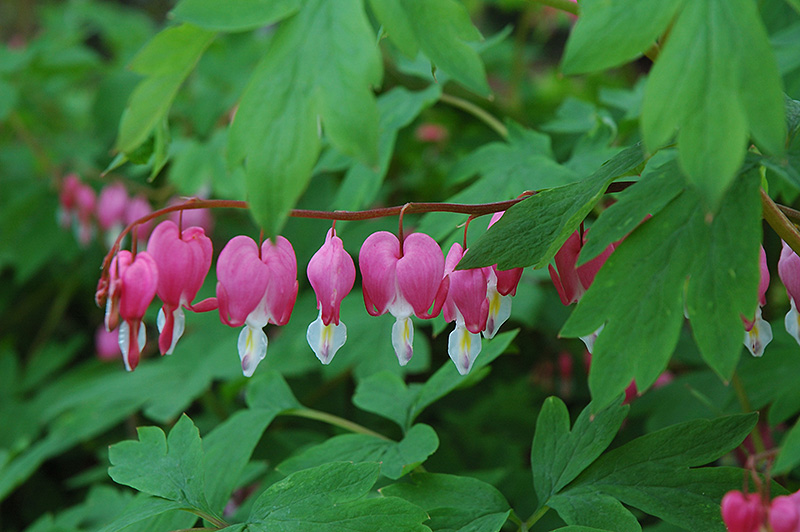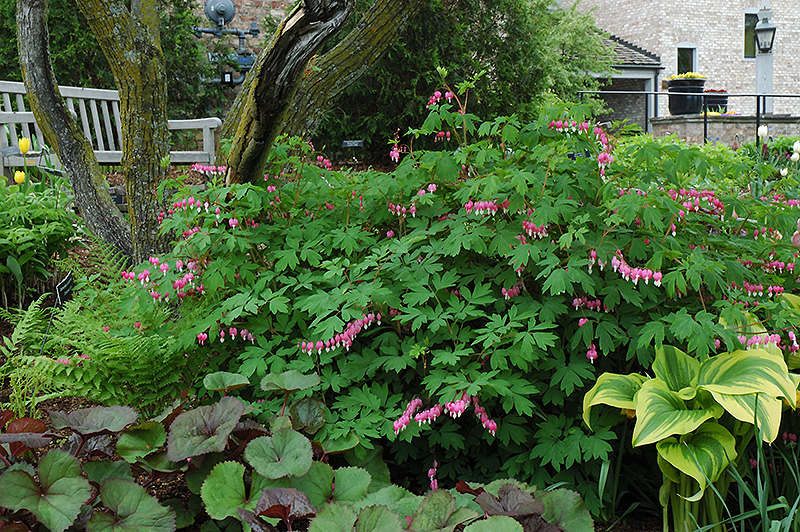Height: 3 feet Spacing: 30 inches
Sunlight:
Hardiness Zone: 1 Other Names: Old Fashioned Bleeding Heart Description: Bushy upright mounded selection features blue-green fern-like foliage and arching stems of heart shaped locket flowers with white protruding petals; excellent for shaded borders and beds; beautiful cut flower; goes into summer dormancy Ornamental Features Common Bleeding Heart features delicate nodding pink heart-shaped flowers with white tips dangling from the stems from late spring to early summer. Its ferny compound leaves remain bluish-green in color throughout the season. Landscape Attributes Common Bleeding Heart is an herbaceous perennial with a mounded form. Its relatively fine texture sets it apart from other garden plants with less refined foliage. This plant will require occasional maintenance and upkeep, and should be cut back in late fall in preparation for winter. It is a good choice for attracting butterflies to your yard, but is not particularly attractive to deer who tend to leave it alone in favor of tastier treats. It has no significant negative characteristics. Common Bleeding Heart is recommended for the following landscape applications; Planting & Growing Common Bleeding Heart will grow to be about 3 feet tall at maturity, with a spread of 3 feet. When grown in masses or used as a bedding plant, individual plants should be spaced approximately 30 inches apart. It grows at a medium rate, and under ideal conditions can be expected to live for approximately 15 years. As an herbaceous perennial, this plant will usually die back to the crown each winter, and will regrow from the base each spring. Be careful not to disturb the crown in late winter when it may not be readily seen! As this plant tends to go dormant in summer, it is best interplanted with late-season bloomers to hide the dying foliage. This plant does best in partial shade to full shade. Keep it well away from hot, dry locations that receive direct afternoon sun or which get reflected sunlight, such as against the south side of a white wall. It prefers to grow in average to moist conditions, and shouldn't be allowed to dry out. It may require supplemental watering during periods of drought or extended heat. It is not particular as to soil pH, but grows best in rich soils. It is somewhat tolerant of urban pollution. Consider applying a thick mulch around the root zone over the growing season to conserve soil moisture. This species is not originally from North America. It can be propagated by division. Disclaimer - This Plant Finder tool is an online resource representing many of the varieties that we carry over the course of the season, and is intended for informational purposes only. Inventory varies seasonally, so we cannot guarantee that every plant will be in stock at all times - please contact the store directly for current availability. It does not include our entire selection of plants, so be sure to visit our store to see varieties that may not be represented on this list.All Seasons Plant Finder
![]()
![]()
![]()
![]()
![]()
![]()
![]()
![]()
![]()
![]()


